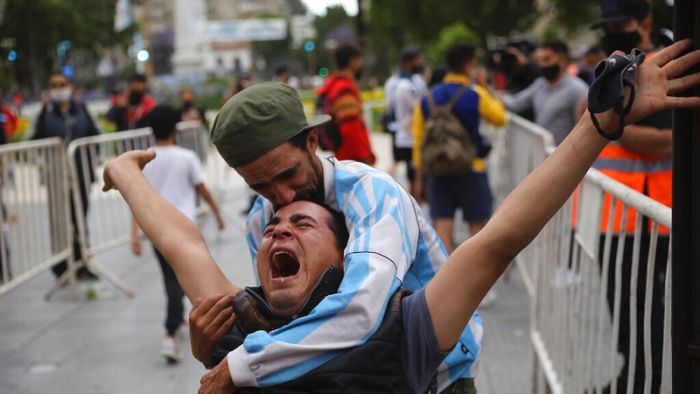Diego Maradona has been buried in a private ceremony attended by only two dozen people — a stark contrast to the scenes where tens of thousands of weeping fans filed past his coffin earlier in the day.
Key points:
- Maradona’s wooden casket was in the main lobby of the Argentinian presidential building for a public viewing
- He was later transported to a cemetery outside Buenos Aires for a small funeral
- The lines started outside the presidential mansion hours after Maradona’s death was confirmed and thousands turned up
Only family members and close friends were permitted at Jardín Bella Vista cemetery for the final religious ceremony and burial of the football legend next to the graves of his parents, Dalma and Diego.
Earlier in the day, the Maradona family ended public visitation after fans threw bottles and metal fences at police outside Argentina’s presidential mansion, Casa Rosada, where his body was lying in state.
Seven Argentinian presidents have received state funerals, with five-time Formula One champion Juan Manuel Fangio the country’s only other sportsperson to receive the honour.
His wooden casket, covered in Argentina’s flag and a Number 10 shirt of the national team, was in the main lobby of the presidential office in the heart of Buenos Aires, where three days of mourning was announced after Maradona’s death.
The coffin was then transported to a cemetery in a hearse, surrounded by motorbikes as it raced down a highway.
“Diego is not dead, Diego lives in the people,” the crowd chanted as the coffin was taken to the cemetery outside the capital.
The motorcade, accompanied by police, was followed on a local highway by dozens of honking motorists.
Hundreds of fans blocked the entry to the cemetery before the arrival of the convoy, dancing and chanting as police moved in to clear a path.
The crowd continued making noise after the final ceremony began.
Solemn scenes inside, clashes on the streets




Fans were allowed into the presidential building early in the morning after a few hours of privacy for family and close friends in the presidential building.
Dozens of football shirts were thrown in by visitors who passed by in tears.
Maradona died of a heart attack in a house outside Buenos Aires where he was recovering from a brain operation three weeks earlier.
The first to bid farewell were his daughters and close family members, then came former teammates of the 1986 World Cup-winning squad, and fellow Argentinian football star Carlos Tevez also paid his respects.




Argentina President Alberto Fernández appeared at midday and placed on the casket a shirt of Argentinos Juniors, Maradona’s first club as a professional, while first lady Fabiola Yañez laid a bouquet of flowers on top.
The lines started outside the Casa Rosada only hours after Maradona’s death was confirmed and eventually stretched more than 20 blocks, with disturbances breaking out at least twice as fans eager to view the casket clashed with security forces in front of presidential mansion, interrupting the flow of visitors.
Among those present were the renowned barra bravas fans of Boca Juniors, one of Maradona’s former clubs.
As fans did start to file inside, tossing dozens of jerseys over the barrier between the public and the coffin, a wave of people tried to force their way past police in riot gear, who used tear gas on the crowd.




Clashes again broke out in the early afternoon as police fired rubber bullets at fans trying to force their way ahead.
Inside, bodyguards were stopping fans from taking pictures and controlling access to the building.
The first fan to visit was Nahuel de Lima, 30, who said Maradona “made Argentina be recognised all over the world”.




“Who speaks of Maradona also speaks of Argentina,” de Lima said.
Like many fans, Lidia and Estela Villalba cried near the exit of the lobby. Both had a Boca Juniors shirt and an Argentinian flag on their shoulders.
“We told him we love him, that he was the greatest,” they said.
Fans who walked past the casket blew kisses into the air, struck their chests with closed fists, and shouted: “Let’s go Diego.”
A giant black screen in front of the Casa Rosada showed historic photos of Maradona.
Some members of the public who went to the Casa Rosada were wearing masks because of the COVID-19 pandemic, but social distancing was at a minimum.
Social worker Rosa Noemí Monje, 63, said she and others overseeing health protocols understood the emotion of the moment.




“It is impossible to ask them to distance. We behave respectfully and offer them sanitiser and face masks,” she said.
A huge mural of Maradona’s face was painted on the tiles that cover the Plaza de Mayo, near the Casa Rosada, which was decorated with a giant black ribbon at the entrance.
Napoli stadium to be renamed for Maradona




In Italy, the Mayor of Naples started a formal process to rename the San Paolo stadium for Maradona, after he led Napoli to its only Serie A titles, in 1987 and 1990.
Built after World War II, the stadium was named for St Paul because of the legend that he docked in the surrounding Fuorigrotta area when he reached Italy.
“We are already putting it together this morning, taking the first steps to dedicate Naples’ stadium to Maradona,” Luigi De Magistris said.
“It’s a process but it will be a quick process because when there is such a strong desire there’s nothing that will hold us up.”
AP/Reuters







